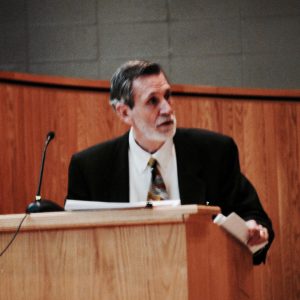
Wednesday night’s Burrillville Town Council meeting hearkened back to the early days of public opposition against Invenergy’s $700 million fracked gas and diesel oil burning power plant planned for the town. Back then, we saw a public that was distrustful of the town council, and a town council that was not receptive to the idea of opposing the power plant, early on claiming to be powerless against the combined might of Invenergy, Governor Gina Raimondo’s office and regulators.
The town council then took the position, contrary to the Open Meetings Act, that people in the town were only allowed to talk about issues and subjects that were specifically listed on the town council’s agenda, cutting off discussion about the Algonquin pipeline if the power plant was on the agenda, or vice versa. In December of last year, calls from the town council to trust them elicited groans of dismay from the audience.
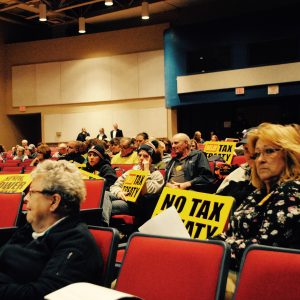 Then, in April of this year, it was learned that the town council had been in secret negotiations for a tax treaty with Invenergy for months. The town council was still forcing residents to only speak about “agenda items” and working hard to curtail public discussion, contrary to the Open Meetings Act. The growing resistance in Burrillville to the power plant felt disempowered. Not only were they fighting a multi-billion dollar power plant company funded by a Russian oligarch, they were fighting both the state and local governments. The fight seemed impossible and trust between the town council and residents couldn’t be worse. Or so they thought.
Then, in April of this year, it was learned that the town council had been in secret negotiations for a tax treaty with Invenergy for months. The town council was still forcing residents to only speak about “agenda items” and working hard to curtail public discussion, contrary to the Open Meetings Act. The growing resistance in Burrillville to the power plant felt disempowered. Not only were they fighting a multi-billion dollar power plant company funded by a Russian oligarch, they were fighting both the state and local governments. The fight seemed impossible and trust between the town council and residents couldn’t be worse. Or so they thought.
At an April 14 town council meeting Council President John Pacheco said that the town council learned about Invenergy’s plans when everyone else did, during a press conference held by Governor Raimondo announcing the plant, saying, “As a town council, we did not know this plant was actually going to happen until the Governor announced it.”
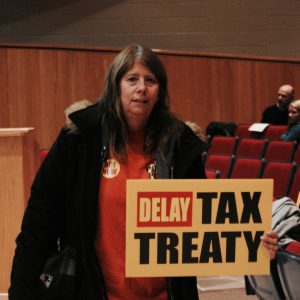 This turned out to be inaccurate. Videos of town council meetings from February and March of 2015, on the town council’s own website, showed the town council and state legislators paving the way for the controversial Invenergy power plant months before the governor officially announced the project. Over time some of the details about how Invenergy approached the town came to light, but the complete story, and who opened what doors to the power plant, has yet to be revealed.
This turned out to be inaccurate. Videos of town council meetings from February and March of 2015, on the town council’s own website, showed the town council and state legislators paving the way for the controversial Invenergy power plant months before the governor officially announced the project. Over time some of the details about how Invenergy approached the town came to light, but the complete story, and who opened what doors to the power plant, has yet to be revealed.
The town council eventually came to a public position regarding the power plant: The town council would put on a public display of strict neutrality, taking no position for or against the power plant, until after all the advisory opinions from various town boards had been completed. This was so as to appear to not influence the outcomes of the various advisory opinions and give the Energy Facilities Siting Board (EFSB) a reason to suspect that the opinions might be slanted in some way.
 State legislators Cale Keable and Paul Fogarty went a different route. They entered legislation at the state level that if passed, would give voters in Burrillville the ability to approve or reject any tax treaty negotiated between the town council and Invenergy.
State legislators Cale Keable and Paul Fogarty went a different route. They entered legislation at the state level that if passed, would give voters in Burrillville the ability to approve or reject any tax treaty negotiated between the town council and Invenergy.
The bill passed the House and was due for consideration and a vote in the Senate when the town council passed a resolution in opposition to the Keable Bill at the 11th hour, giving the Senate Judiciary Committee enough of a reason to vote down the bill. The relationship between the town council and residents was now overtly acrimonious. There were tears from Town Councilor Kimberly Brissette Brown and anger and accusations from Town Councilor Donald Fox. Residents spoke of feeling “humiliated” at the State House as the press release announcing the resolution was sprung on them by Senators Frank Lombardi and Steven Archambeault, who treated the residents with risible condescension.
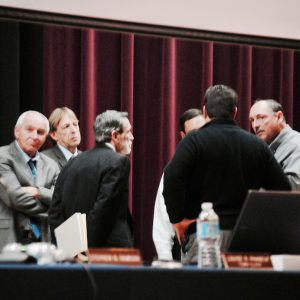
Since that low point, the town council and residents worked to rebuild trust. Residents by this time were long past being held to arbitrary and incorrect readings of the Open Meetings Act. They spoke their minds, expressed their concerns and the town council, to their credit, finally seemed to be listening. They seemed to come together as a town when Governor Gina Raimondo visited to hear resident concerns about the power plant.
After the lengthy process of creating the advisory opinions concluded, the town council passed an extremely robust resolution opposing the power plant and asked other city and town councils in and around Rhode Island to join them in opposition. Many already have and many more are considering joining Burrillville in opposition to the plant. But the Burrillville Town Council’s opposition came with a caveat: They still planned to sign a tax treaty with Invenergy, a tax treaty that the town residents want to hold off on signing.
At issue is the timing. The town council maintains that they have negotiated a solid tax treaty that will protect the town in the event the power plant is built, and guarantee a steady stream of income to the town. The residents want to wait until after the EFSB decides on Invenergy’s application before signing any treaty. Right now, the power plant’s application is suspended, pending Invenergy’s search for a new source of water. Signing the tax treaty, say residents, gives Invenergy extra leverage in negotiating a deal with another municipality, like, let’s say, Woonsocket, to purchase water. The town’s opposition to the power plant must be unified and consistent. Opposing the power plant with a resolution sends one message, signing a tax treaty with Invenergy sends another.
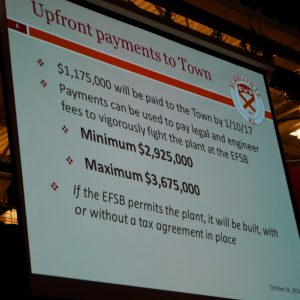 At Wednesday night’s hearing, Attorney Michael McElroy, who negotiated the tax treaty, said that the opposing the power plant and signing a tax treaty were not inconsistent actions and would not be seen that way. “I want to make it… clear that I see no inconsistency between entering into these agreements and dead set opposition to the plant,” said McElroy.
At Wednesday night’s hearing, Attorney Michael McElroy, who negotiated the tax treaty, said that the opposing the power plant and signing a tax treaty were not inconsistent actions and would not be seen that way. “I want to make it… clear that I see no inconsistency between entering into these agreements and dead set opposition to the plant,” said McElroy.
But McElroy is a lawyer. He is not a business man trying to buy water to cool a power plant. What businessman wouldn’t mention the tax treaty as proof that the town council is actually okay with having the power plant sited in their town? The resolution in opposition will be described behind closed doors as merely political theater, something to satisfy the rubes while the real business of government is imposed by the movers and shakers in secret meetings paid for with political contributions.
McElroy did his best to sell the tax treaty to the residents. He spent 45 minutes outlining the deal, expressing the need for a treaty. One reason McElroy gave, that didn’t sit well with residents, was that, “I want to get paid.” The money generated by this tax treaty will give the Town of Burrillville the money it needs to fight the siting of the power plant all the way to the Supreme Court, if need be. The lawyers and experts needed to fight such a case cost money, said McElroy, who included himself in those expenses.
McElroy suggested that if the town council did not pass the tax treaty, Invenergy might pull it off the table. He assured the audience that contrary to what Conservation Law Foundation senior attorney Jerry Elmer says, the plant will be built without a tax treaty in place.
Residents weren’t buying it. Towards the end of what turned out to be a five hours plus meeting, it was obvious that the town’s people were not willing to drink the tax treaty Kool-Aid. Forty people spoke against passing the tax treaty. Two spoke in favor of trusting the town council and McElroy’s advice.
Ultimately the town council recessed without doing anything on the tax treaty. There is a plan to take up the issue again next week.
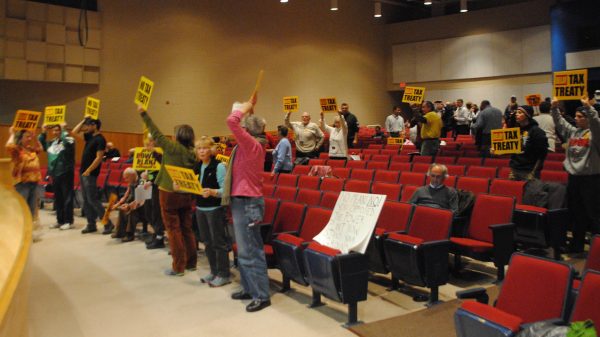
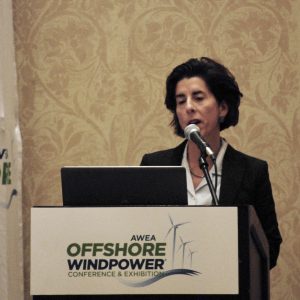
Governor Gina Raimondo was the introductory speaker Tuesday morning at the AWEA Offshore WindPower 2016 conference in Warwick. Raimondo spoke to the conference attendees, mostly representatives of various wind power companies and allied industries, with some federal and state government employees on hand as well. Raimondo was keen on selling Rhode Island as a place for the growth and development of renewable energy such as solar and wind.”
“I am an advocate for the environment,” said Raimondo, “and I usually begin my comments in audiences such as these talking about the reality of climate change… Climate change is real, caused by human activity and not going to go away on it’s own. It’s up to us, policy makers, business leaders, entrepreneurs to meet the challenge of climate change.”
 Comparing the problem of climate change to her work on pension reform, Raimondo said, “Climate change isn’t that different from big, thorny fiscal issues, which is to say it’s not going to go away unless we take action and it’s only going to get harder the longer we wait. So we have to meet the challenges of climate change with urgency and a seriousness of purpose, in the same way we would with other fiscal challenges.”
Comparing the problem of climate change to her work on pension reform, Raimondo said, “Climate change isn’t that different from big, thorny fiscal issues, which is to say it’s not going to go away unless we take action and it’s only going to get harder the longer we wait. So we have to meet the challenges of climate change with urgency and a seriousness of purpose, in the same way we would with other fiscal challenges.”
The governor then made her pitch for creating jobs in the state. “As Governor of Rhode Island I want my state to be a leader. Number one, it’s the right thing to do, number two, I want our state to be known as the state that solves problems and meets challenges. But number three, the silver lining in meeting the challenge of climate change is that we can create jobs.
“The good news here is that we can create jobs in solar, in wind, in energy efficiency, and those are the kind of jobs that I want to have here in Rhode Island.
“My message is that all the things about Rhode Island that enabled us to be first, with Deepwater Wind, are the reason you ought to think about doing business in Rhode Island,” said Raimondo, before making a very questionable claim that, “we have no fossil fuel industry here in Rhode Island. We’re not ‘as attached’ to [the] ‘good old’ fossil fuel industry. That’s a big deal. That means we have a culture embracing of this industry [wind energy].”
The governor’s press secretary, David Ortiz, later clarified what Governor Raimondo meant by this statement, saying that, “her point was that the state has no fossil fuel deposits and does not extract natural gas, crude oil or coal.”
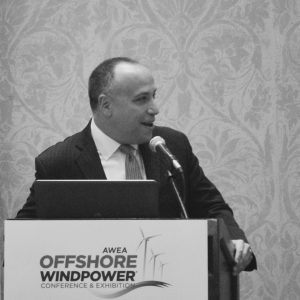
Though this is true, it does not follow that Rhode Island has a “culture” embracing alternative energy. The fossil fuel industry has a giant economic, political and environmental presence in the state.
Putting aside the proposed Burrillville power plant, or any other of the proposed LNG infrastructure expansions in various stages of being approved, “Rhode Island’s Port of Providence,” according to the US Energy Information Administration (USEIA), “is a key regional transportation and heating fuel products hub” and “natural gas fueled 95 percent of Rhode Island’s net electricity generation in 2015.”
The USEIA goes on to say that Rhode Island “does not produce or refine petroleum,” as Raimondo’s office clarified, but, “Almost all of the transportation and heating fuel products consumed in Rhode Island, eastern Connecticut, and parts of Massachusetts are supplied via marine shipments through the Port of Providence. The port area has petroleum storage tanks, and a small-capacity petroleum product pipeline runs from the port to central Massachusetts.”
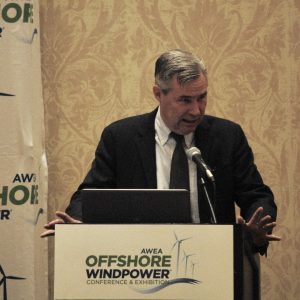
Rhode Island is heavily dependent on LNG imports. “Electric power generators and the residential sector are Rhode Island’s largest natural gas consumers. More than half of the natural gas consumed in the state goes to the electric power sector and almost all in-state electricity generation is fueled with natural gas,” says the USEIA, “Historically, natural gas has arrived in Rhode Island from producing areas in Canada and from the U.S. Gulf Coast and Mid-Continent regions, but increasing amounts of natural gas are coming from Appalachian Shales, particularly the Marcellus Shale of Pennsylvania.” This makes Rhode Island heavily dependent on fracked gas for its power generation.
And finally, as far as the dirtiest fossil fuel, coal, goes, “Providence is one of the leading coal import centers in the northeast, receiving one-tenth of the imported coal delivered to eastern customs districts in 2015. The state is part of the six-state Independent System Operator-New England (ISO-NE) regional grid. And, although Rhode Island and Vermont are the only two states in the nation with no coal-fired electricity generation, the ISO-NE grid remains dependent on coal-fired facilities during periods of peak electricity demand.”
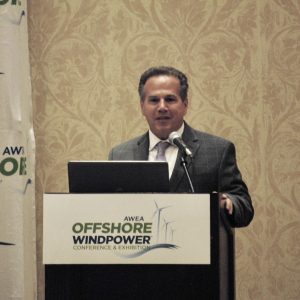
So, although Rhode Island has no industry producing or refining fossil fuels, Rhode Island is heavily burdened and intertwined with the fossil fuel industry. We are soaking in fossil fuels as an importer and exporter. We fund the fracking of America with our energy choices, and even as we are economically and politically dictated to by companies like National Grid, Spectra, Invenergy and Motiva (a subsidiary of Saudi Aramco and Shell Oil Company, we bear the environmental scars of their abuse of our habitats and our health.
This is the fossil fuel industry in Rhode Island.
It is massive and it is killing us.
Also speaking at the AWEA Offshore WindPower 2016 conference was Deepwater Wind’s Jeff Grybowski, Senator Sheldon Whitehouse and Representative David Cicilline.
]]>
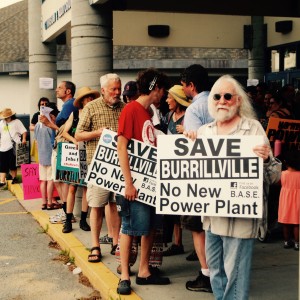 On Wednesday the Burrillville Town Council will be discussing the proposed tax treaty with Invenergy, the company that wants to build a $700 million fracked gas and diesel oil burning power plant in the town. The timing of this discussion could not be worse. Invenergy just successfully petitioned the Energy Facilities Siting Board (EFSB), the governmental body tasked with with approving or rejecting the plant, for a 90 day extension on their application. Because Invenergy can’t find the water it needs to cool the plant, for the first time the company is on the ropes. Approving a tax treaty at this time will give the company a much needed win, and might turn the tide in their favor.
On Wednesday the Burrillville Town Council will be discussing the proposed tax treaty with Invenergy, the company that wants to build a $700 million fracked gas and diesel oil burning power plant in the town. The timing of this discussion could not be worse. Invenergy just successfully petitioned the Energy Facilities Siting Board (EFSB), the governmental body tasked with with approving or rejecting the plant, for a 90 day extension on their application. Because Invenergy can’t find the water it needs to cool the plant, for the first time the company is on the ropes. Approving a tax treaty at this time will give the company a much needed win, and might turn the tide in their favor.
Invenergy is searching for the water they need. An Access to Public Records Act (APRA) request from RI Future has revealed that Woonsocket Mayor Lisa Badelli-Hunt’s office has had two meetings with Invenergy officials. On September 7 there was a 30 minute meeting and on September 20 there was a 60 minute meeting. Other meetings may have occurred since then. We know from statements made at the October 3 Woonsocket Town Council meeting that these discussions were not about siting the plant in Woonsocket. These discussions, assumed to be ongoing, are about water. Whatever bargaining position Invenergy has in their discussions with Woonsocket, or any other entity contemplating providing the water Invenergy needs, will be enhanced by the existence of an approved tax treaty.
Passing a tax treaty will send mixed signals to the rest of the state. On September 22 the Burrillville Town Council issued a strong statement in opposition to the proposed power plant. They sent out missives to cities and towns through Rhode Island, Connecticut and Massachusetts asking for other town and city councils to pass resolutions in solidarity with Burrillville. So far at least four municipalities have done so, Lincoln, Glocester, North Smithfield and Middletown. How foolish will these councils feel if Burrillville proceeds to negotiate with the company they’ve asked for support in opposing? How eager will other municipalities be to pass their own resolutions going forward?
Jerry Elmer, senior attorney for the Conservation Law Foundation (CLF) believes that the Town of Burrillville “is under zero obligation to enter into a tax treaty,” adding, “By ‘zero obligation,’ I mean: zero legal obligation, zero ethical obligation, zero political obligation. The Town has tax laws on the books, and those existing tax laws will determine Invenergy’s tax obligation if there is no tax treaty.
“Invenergy can (and likely will) make all kinds of threats about what will or will not happen in the absence of a tax treaty, but the threats are empty,” continues Elmer, “The bottom line is that: (a) The Town can simply choose not to enter into a tax treaty. (b) If the Town chooses not to enter into a tax treaty there is nothing that Invenergy can do. (c) If the Town chooses not to enter into a tax treaty, it is virtually certain that Invenergy will go away.
“But can’t Invenergy sue the Town of Burrillville to try to force the Town to enter a tax treaty?” asks Elmer, before answering, “Technically, the answer is “yes,” Invenergy can sue the town – and, yes, the town would have to spend some money to defend such a lawsuit. But Invenergy could not win such a lawsuit. Remember what law school professors like to say: ‘You can always sue.’ I can sue you for wearing a blue suit (or for your taste in movies). But just because one can bring such a stupid, frivolous lawsuit does not mean that one can win such a stupid lawsuit.
“So, too, with Invenergy and a tax treaty. The Town of Burrillville can decline to enter into a tax treaty with Invenergy, and there is nothing Invenergy can do to force the issue.
“The message to each and every member of the Town Council is simple, so simple it can be put into a single sentence: ‘Vote down any tax treaty.’ Or: ‘Don’t even vote on a tax treaty.’ Or: ‘Don’t vote on a tax treaty, and don’t approve a tax treaty.’ None of those sentences is complicated; none of those involves weird, technical legal mumbo-jumbo. Everyone can understand the point.”
 Attorney Alan Shoer, of Adler Pollock & Sheehan, has been representing Invenergy during their application process in front of the EFSB. A look at Shoer’s bio page on his law firm’s website runs down his skills and accomplishments. Shoer is presented as an expert in “all aspects of energy, environmental, and public utility law.” He has “experience in wind, solar, hydro and other renewable energy matters,” and “has represented developers, investors, contractors, utilities, and municipalities in several successful and innovative sustainable energy projects.”
Attorney Alan Shoer, of Adler Pollock & Sheehan, has been representing Invenergy during their application process in front of the EFSB. A look at Shoer’s bio page on his law firm’s website runs down his skills and accomplishments. Shoer is presented as an expert in “all aspects of energy, environmental, and public utility law.” He has “experience in wind, solar, hydro and other renewable energy matters,” and “has represented developers, investors, contractors, utilities, and municipalities in several successful and innovative sustainable energy projects.”
Note what Shoer does not include in his online resumé: Anything at all to do with his strong advocacy for companies that want to expand Rhode Island’s dependence on fracked gas.
Like Governor Gina Raimondo, who never misses an opportunity to publicly champion wind and solar power but downplays her support of fracked gas, and like Senator Sheldon Whitehouse who humbly accepts the laurels heaped upon him for his environmental activism in the Senate but can’t find the time to publicly oppose fracked gas infrastructure in his own state, Alan Shoer seems to want his paid advocacy for fossil fuels companies like Invenergy to go unnoticed.
And this is for a good reason: Twenty years from now, no one will want their name to be attached to the moldering LNG monstrosities, brown fields and contaminated properties left in the wake of the coming fossil fuel collapse. Who wants to tell their children and their grandchildren that they helped destroy the environment when they knew the world was under threat and they knew that they were championing a dying and deadly industry? Carefully shaping their public image today is a way, hopes Raimondo, Whitehouse and Shoer, of shaping the way history will judge them.
But we won’t let the world forget their part in this, will we?
This is why Invenergy would be foolish in suing Burrillville. Not only can they not win, as Jerry Elmer points out above, but in doing so they will be exposing themselves as the villains they are. Burrillville may have to spend money defending themselves against such a lawsuit, but I will bet that most or all of the money Burrillville needs to defend themselves could come from something like an online GoFundMe effort. Fracked gas is enormously unpopular in New England, and becoming more unpopular by the day. Only those who continue to believe the lies of the fossil fuel companies, (and they’ve been lying for decades about climate change, as it turns out) that is, the most gullible or ideologically pathological, believe that fossil fuels are the future.
About 244 years ago, a group of Rhode Islanders in Warwick stood up against British tyranny and torched the Gaspee, starting a series of events that led to the American Revolution. Today, in Burrillville, a group of Rhode Islanders is standing up to the fossil fuel oligarchy and when they win, it will mark a turning point in the climate change battle, and the effects could be as significant as those at Gaspee Point in 1772. Rhode will become, in the words of Timmons Roberts, writing for the Brookings Institute, “a leader of a new energy age for the U.S.,” instead of “a middling actor locked into fossil fuel infrastructure for decades.”
The Burrillville Town Council has an opportunity Wednesday night to save the town, the state, and the world.
Be there.
]]>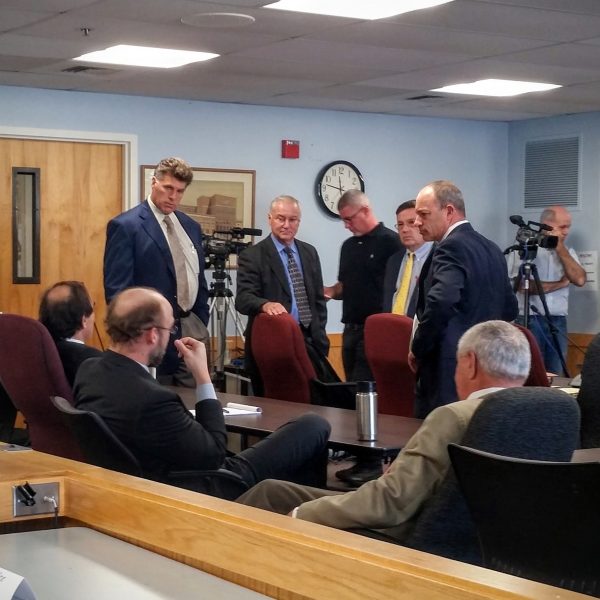
Amid audience shouts of “Shame on you!” and “Merry Christmas, Invenergy!” the Energy Facilities Siting Board (EFSB) voted unanimously to grant Invenergy a 90 day suspension on their application to build a $700 million fracked gas and diesel oil burning power plant in Burrillville, effectively quadrupling Invenergy’s previous 30 day extension.
Once Pascoag voted to terminate their letter of intent with Invenergy to provide water to cool Invenergy’s proposed power plant, and Harrisville also declined to provide water, the company asked for 30 days to find an alternative source. They were granted a 30 day extension 30 days ago and despite negotiating with Woonsocket for the water needed to oil the power plant, nothing concrete was presented at today’s hearing.
Instead we heard Invenergy lawyer Alan Shoer claim that Pascog’s termination of their letter of intent came “very late in the process, after almost a year of working with Invenergy.” This made it impossible for Invenergy to come up with an alternative plan, complained Shoer. Attorney Jerry Elmer with the Conservation Law Foundation (CLF) later countered that “Invenergy made a careful, conscious, deliberate decision to file an application with the EFSB that had very tight, strict, statutory deadlines for things happening, before they had a secure water source… That was Invenergy’s sole election.”
In other words, continued Elmer, Invenergy knew that their non-binding letter of intent “may not result in a water source.”
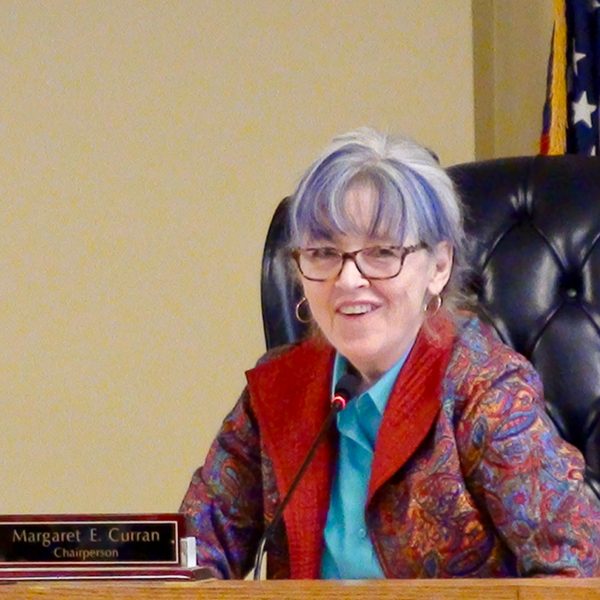
The 90 day suspension comes with the minor caveat that Invenergy provide a status update in 60 days. The update must show concrete progress in securing a water source, though it is unclear what penalty Invenergy may face if they do not deliver an update that is satisfactory to the board. Criteria for the update seemed sketchy.
In 90 days, Invenergy must be able to present a water source to the board, along with a plan to transport the water to the location of the power plant. Burrillville recently provided a list of criteria that board member Janet Coit suggested would need to be satisfied for the suspension to be lifted. The criteria includes the source of the water, the means of transmission of the water, and the disposal of waste water, among other concerns.
In the event that Invenergy is unable to come up with a water supply, Coit suggested that the EFSB might be open to further suspensions at that time, effectively suggesting unlimited time for Invenergy to get their application in order, unless the board decides to dismiss the application per the motions from the Conservation Law Foundation and the Town of Burrillville.
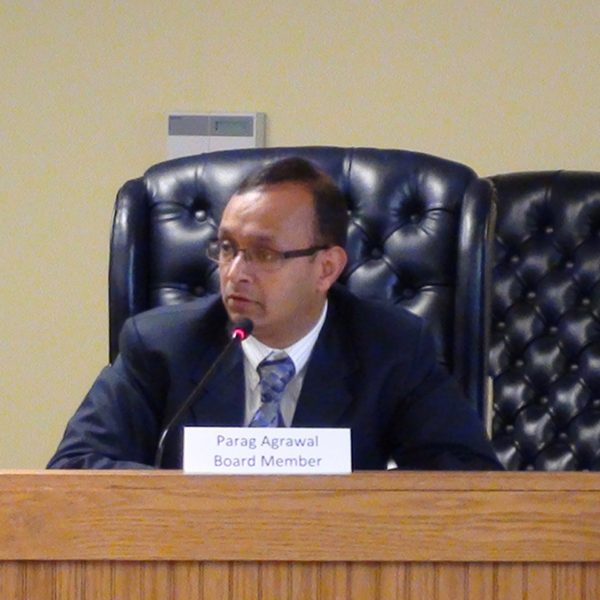
Lawyer Michael McElroy gave a stellar speech to the board in support of dismissing Invenergy’s application, even going so far as to quote Marvel Comics’ Stan Lee. McElroy also directly confronted Chair Margaret Curran and board members Parag Agrawal and Janet Coit about concerns that the EFSB’s process “may be dictated by” Governor Gina Raimondo.
“The Town of Burrillville does not want this plant,” said McElroy, “I think that’s been made clear to this board. This plant would be a polluting monster that violates the town’s comprehensive plan and zoning ordinances and would negatively impact impact the quality of life for all Burrillville residents.
The EFSB, continued McElroy, “has been given extraordinary legal powers to grant permits that would otherwise be granted by my client, the Town of Burrillville. You have in essence become, among other things, the town’s planning board, its zoning board and its building inspector. But with such great power comes great responsibility. Your most important power and responsibility is to fully, fairly and impartially evaluate all of the issues that come before you after hearing from all of the parties on those issues.”
“The residents of the town and my clients have become concerned that throughout this process that the board’s votes on this process may be dictated by the governor, who has repeatedly and publicly expressed her support for this project despite the town’s overwhelming opposition. This board’s ill-advised and illegal previous attempts to silence the town and prevent it from being heard today only reinforces that concern.
McElroy urged the board to dismiss the docket, not suspend it. “Suspending the docket instead of dismissing it would give Invenergy what amounts to a gift of an indefinite suspension,” said McElroy. “The town has been fighting this battle now for almost a year at great monetary and emotional expense.”

McElroy’s fiery comments stand in sharp contrast to those of Jerry Elmer, who added that though the lack of water was a major issue that precipitated the motion to suspend, there was also the issue of a lack of information from Invenergy that caused six of the twelve advisory opinions to the board to be submitted incomplete.
After the board rendered its decision those watching the proceedings left the room singing “We shall overcome.”
Those from Burrillville I talked to were angry and disappointed by the ruling. They feel the process is corrupt and stacked against them. They feel that they are being forced to attend yet more town and city council meetings throughout the state in an effort to garner support and prevent the sale of water to Invenergy. Their holidays will now be filled with research, activism, environmental reports and endless meetings in towns and cities throughout the state and beyond to garner support for their cause and to prevent Invenergy from securing a source of water.
Yet though the process seems corrupt and Invenergy seems intent on grinding away their resolve, the people I talked to were adamant that they would not give up or stop fighting.
]]>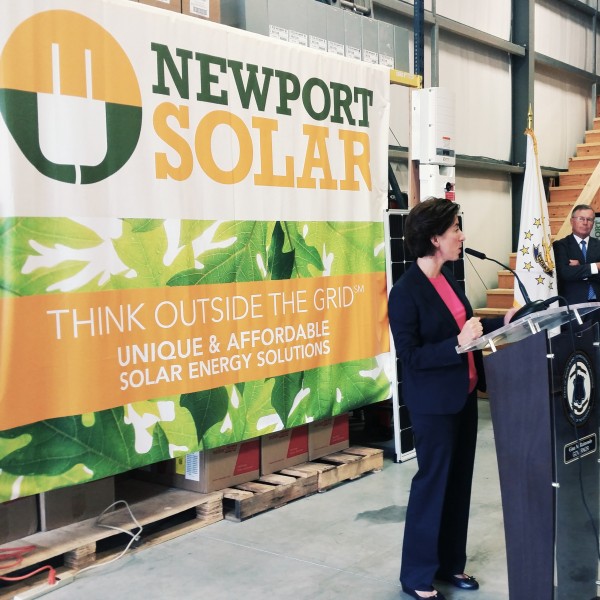
“At breakfast this morning my nine year old, out of the blue, said, ‘Mom, what are you doing about climate change?’” said Governor Gina Raimondo at a press event in the offices of Newport Solar on Monday, “What a perfect day to ask the question! So I told him all about this and he was proud of me that we were on that.”
Newport Solar in North Kingstown is where Raimondo chose to kick off National Energy Awareness Month with her new Office of Energy Resources (OER) commissioner Carol Grant. Newport Solar is a Rhode Island leader in solar installation, and its successful efforts should be lauded.
“Our clean energy sector in Rhode Island has created a slew of new opportunities for education and jobs, and that will continue as we move forward in building the clean energy industry,” said Raimondo at the event.
Commissioner Grant spoke about Rhode Island’s high ranking in the State Energy Efficiency Scorecard. The American Council on Energy‐Efficient Economy (ACEEE) recently ranked Rhode Island fourth in the country for best energy efficiency programs and policies. “We want to educate Rhode Islanders on the many benefits of the state’s energy efficiency and renewable energy programs,” said Grant, “and we look forward to further developing a future of clean, affordable, reliable and diversified energy.” [italics mine]
Also at the event was Michael Ryan, Vice President of Government Affairs at National Grid, encouraging Rhode Islanders to save energy.
Energy in Rhode Island needs to be “affordable, reliable, and clean” said Raimondo, “It’s got to be all three, and it can be all three.”
Later, Raimondo’s three criteria had mysteriously become four, or more. “So I’m going to continue to lead and push, as your governor, towards more clean, affordable, and reliable and diversified energy sources… to lead the nation in more and more sources of clean, renewable, affordable, sustainable energy.”
Towards the end of the presser, National Grid’s Michael Ryan, ironically standing in front of a large Newport Solar banner emblazoned with the tagline, “Think outside the grid,” mis-repeated Raimondo, saying that the energy must be “efficient, affordable and reliable.
“Those are key with National Grid.”
In the video below you can watch the complete press event. Solar, wind and efficiency were lauded but fracked gas, the third leg of Raimondo’s energy policy, and a key driver of National Grid’s business, was never mentioned except via subtle dog whistles.
These dog whistles are words like reliable, diversified and efficient. These are the words anti-environmentalists use when they want to scare us into accepting fracked gas as a bridge fuel, like when Rush Limbaugh said, “Solar panels are not sustainable, Millennials. May sound good, yes. ‘Clean, renewable energy.’ But what do you do when the sun’s down at night? What do you do when the clouds obscure the sun? We’re not there yet.”
Limbaugh admits that solar panels are clean and renewable. But he’s doubting their reliability and sustainability.
This is how a politician like Raimondo can appease companies like National Grid, which are actively working to expand Rhode Island’s dependence on fossil fuels, while publicly talking only about the work she’s doing on energy that’s actually clean and renewable.
On April 13 Raimondo appeared at a solar farm in East Providence to announce the results of the 2016 Rhode Island Clean Energy Jobs Report released by the Rhode Island OER and the Executive Office of Commerce. At this event Marion Gold, who publicly supported the power plant planned for Burrillville, was still the OER commissioner.
“The clean energy economy is supporting nearly 14,000 jobs,” said Raimondo, “a forty percent increase from last year. That is amazing.”
The press release for this event noted that this job growth was likely the result of the “maturation of the solar industry, start up activity in smart grid technologies, and the progress made on the construction of the Block Island Wind Farm.”
There was no mention at this event of fracked gas, Burrillville, Invenergy, Spectra pipelines, or National Grid’s expansion of LNG at Fields Point, until reporters asked the governor about it directly, at which point Raimondo somewhat reluctantly admitted that she does in fact support Invenergy’s $700 million fracked gas and diesel oil burning power plant planned for Burrillville.
In Raimondo’s capacity as vice chair of the Governors’ Wind Energy Coalition she was proud to “support the foresight of my colleagues to broaden the Coalition’s focus and include solar energy development as a policy priority. Wind and solar provide complementary benefits to the U.S. electric grid and will help diversify the country’s energy mix. The need for states to take a broader view of renewable power is clear.”
Again, no mention of her support for fracked gas.
 Raimondo has consistently touted her support for renewables like wind and solar, only occasionally voicing her support for fracking. Raimondo never holds a press release in front of a fracked gas pipeline or compressor station. She holds them at wind turbines and solar farms, giving the appearance of a strong leader on the environment.
Raimondo has consistently touted her support for renewables like wind and solar, only occasionally voicing her support for fracking. Raimondo never holds a press release in front of a fracked gas pipeline or compressor station. She holds them at wind turbines and solar farms, giving the appearance of a strong leader on the environment.
But National Grid and Invenergy need to know she’s on board with their plans, so she signals her support during the press conference with careful phrasing.
And if the governor’s phrasing is off message, National Grid’s Michael Ryan will misquote her. “Clean” energy is out, “reliable” energy is in. In other words, “Let them eat fracked gas.”
Raimondo’s choice of location for her press conferences demonstrates that if she is not embarrassed by her support of fracked gas, she at least is beginning to recognize how history will ultimately judge her support.
As Bill McKibben said in a recent message to Rhode Island, “Five to ten years ago we thought the transition was going to be from coal, to natural gas as some sort of bridge fuel, onto renewables and now, sadly, we realize we can’t do that in good faith, because natural gas… turns out to be a dead end, not a bridge to the future but a kind of rickety pier built out into the lake of hydrocarbons.”
Fracked gas was well known to be a bad idea when Raimondo stood with Invenergy’s CEO Michael Polsky and tried to sell the idea to Rhode Island. Raimondo’s support for Invenergy’s power plant was a massive political blunder with consequences not only for her political career, but for the future of Rhode Island and the world.
A future, and a world, her children will be living in.
]]> Mayor Jorge Elorza appeared with his team from Providence Planning to present a draft proposal for the 6/10 Connector Monday night. The plan took the form of a parkway.
Mayor Jorge Elorza appeared with his team from Providence Planning to present a draft proposal for the 6/10 Connector Monday night. The plan took the form of a parkway.
The looming context of the meeting was Governor Gina Raimondo’s September 7th announcement to rebuild the highway as-is. Though the bridges in question remain open to car and truck traffic, Gov. Raimondo and Rhode Island Department of Transportation Director Peter Alviti have maintained that the condition of the bridges creates an emergency situation in which the planning process must be severely curtailed. On the 7th, Director Alviti stated that the surface boulevard was “dead”. [It seems like this would be well known, but for full disclosure, that boulevard proposal came through the group Moving Together Providence, of which I am one founding member].
If there had been any hopes that the City of Providence would reignite the boulevard proposal, it did not happen Monday. The parkway plan honed very close to the design of a highway. The city’s plan made a number of changes to the RIDOT proposal that improved neighborhood connectivity through biking and walking access.
I’m going to take off my objective journalist hat and comment on some things I liked and did not like, as well as some things I continue to have questions about, as we move forward.
Good: Reclaiming Land
While the parkway continues to take up an extraordinary 240’ of width, the city’s plan nonetheless reduces the footprint in places to half of what the highway would be. This has allowed the city to claim fifty of the seventy acres originally expected to be developable under the surface boulevard proposal.
The Providence proposal reclaims significant land in Olneyville, with a phase two proposal to extend DePasquale Square into about half of the 13 acres of Federal Hill that were lost to the Dean Street exit/entrance ramps.
Good: Creating new connections for Smaller Streets like Magnolia and Tobey
As a former resident of Tobey Street, one of my favorite proposals was changing the Tobey Street on-ramp into a bridge connecting Federal Hill to Olneyville. Street grid connections like this are a good idea.
Bad: Continued Use of Traffic Pseudo-Science
Traffic engineers who are in any way honest understand that it does not make sense to do traffic counts on a road and then plan capacity for that roadway accordingly. Numerous highways have been removed and seen a significant part of the traffic that uses those highways disappear, and this is such a common occurrence that it is now a routine understanding. Given the political context of pressure from RIDOT to reify traffic counts, the City of Providence Planning Department did the logical thing, which was to base its various proposals on projections about how many cars would be on 6/10. This is going to make many of the otherwise reasonable proposals less livable. It’s a shame to see the boulevard proposal die on the western half of the roadway that inspired Cheonggyecheon.
Good: Preserved Space for Enhanced Amtrak and MBTA Upgrades
While Amtrak continues to look into whether to reorient the highly-traveled Northeast Corridor through Worcester instead of Providence, the Planning Department’s proposal to keep land open for enhanced rail travel is an important part of the economic and quality-of-life picture.
Bad: Stroad Design for Connecting Streets
The images used for connecting streets were four lane roads with anemic looking bike lanes alongside them. Urban streets should be two lanes, with even the most traffic-oriented streets getting two lanes with a turn lane. The bike lanes put in these proposals are anemically narrow (Dutch infrastructure goes for 4 meters to allow bikes to pass one another) and is without separation. These streets need a road diet.
Bad: Bait-and-Switch on the Roundabout
 The Providence Planning proposal made use of a widely circulated image of a raised roundabout in the Netherlands, which serves bicycles crossing a Dutch highway. Problematically, this image was intended to go besides a proposal for a raised car roundabout to connect Routes 6 East and West and Route 10.
The Providence Planning proposal made use of a widely circulated image of a raised roundabout in the Netherlands, which serves bicycles crossing a Dutch highway. Problematically, this image was intended to go besides a proposal for a raised car roundabout to connect Routes 6 East and West and Route 10.
Roundabouts are not inherently a bad idea, but the use of this Dutch image is misleading. (Surface) roundabouts are an economical and safe way to connect roads that are high volume. (Would a raised roundabout that of course has many structures holding it up be cost-effective? That remains to be seen). They cost less than signalized intersections and usually allow more steady flow of traffic, causing them to be the default treatment in some states. Smaller roundabouts like the one carried out in Poynton, UK can be used in such a way as to create more pedestrian friendly areas while moving a surprisingly large number of vehicles. Larger roundabouts like those seen on Parisian boulevards can also carry a lot of traffic, but are being greatly curtailed as Paris attempts to revitalize the pedestrian connections around its major squares. Dutch bike design takes pedestrian and bike crossings away from roundabouts, while using them as a connection for cars.

In short, the roundabout should be understood as what it is: part of the parkway (which is really just a word for a scenic highway). The other connections need to put bike, pedestrians, and transit in the forefront.
Bad: No Real RIPTA Vision
While Providence Planning presented its efforts to remove cars from Olneyville Square via the raised roundabout as a way of improving through-flow of RIPTA buses, this follows the same induced demand logic that other traffic congestion schemes follow. Making a more direct connection between 10 N and 6 W will definitely take cars out of Olneyville immediately, but the pattern is that within a very short time traffic will fill that space and find equilibrium. So plans to create transit improvements need to acknowledge that. One way to improve transit-flow and make Olneyville more business friendly would be to disallow car through-traffic (allowing cars to visit and park at the edge, but pedestrianizing the center of the square is an idea that has its origins with Jef Nickerson of GCPVD). Having designated areas of the square for bus travel would then allow for better transit flow, though Providence Planning should be cognizant of the dos and don’ts about pedestrian spaces.
There also should be Bus Rapid Transit on the boulevard itself. I’ve pointed out in the past that while BRT does have some costs associated with it, a lot of the biggest costs going along with the RIDOT BRT proposal were added lanes for the BRT, and skyway bridges to connect pedestrians to center stations on a highway. A parkway continues to be a road designed with high speeds in mind, and I’m not certain how BRT could be best handled on a roadway like this, but I think it should be explored.
Getting Mugged by RIDOT
Two television stations and two newspapers asked me what I thought of the plan, and I compared it to a mugging. The Rhode Island Department of Transportation has very transparently used safety concerns about the Huntington Bridge to torpedo normal rules of process for deciding what to do with the highway. Essentially, Providence Planning has its back against the wall, and RIDOT is saying, “Your money, or your life?” Given that very limiting context, what Providence produced was a reasonable compromise that I can live with, in the same way that I accept other unpleasant realities forced upon me. I think the plan is leaps and bounds ahead of RIDOT’s proposal, but that’s not setting a high bar.
]]>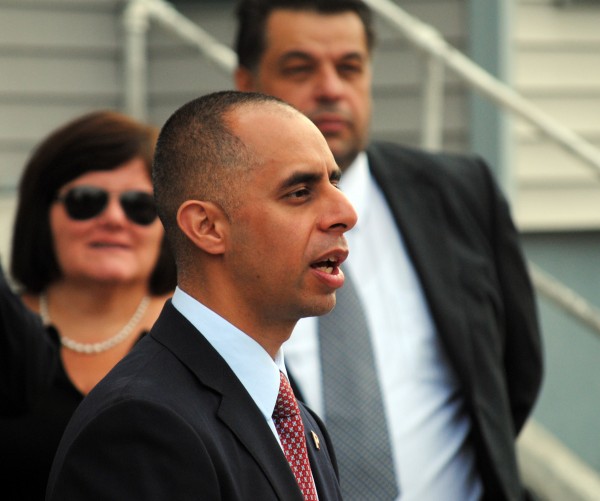 With 500 Rhode Island janitors in the final days of contract negotiations before calling a strike, Providence Mayor Jorge Elorza said he won’t cross their picket line if a work stoppage occurs.”If this situation does lead to a strike by workers, I will not cross their picket line,” Elorza said in a statement to RI Future. “As Mayor, I am aware of the important role the workers of Local 32 BJ SEIU play for many businesses in Providence. While I remain optimistic that they will be able to negotiate an agreement, I am offering the support of my administration in whatever way we can help to resolve this matter. I hope that the employees’ requests are taken seriously and that this matter can be resolved fairly for all involved before it resorts to a strike.”
With 500 Rhode Island janitors in the final days of contract negotiations before calling a strike, Providence Mayor Jorge Elorza said he won’t cross their picket line if a work stoppage occurs.”If this situation does lead to a strike by workers, I will not cross their picket line,” Elorza said in a statement to RI Future. “As Mayor, I am aware of the important role the workers of Local 32 BJ SEIU play for many businesses in Providence. While I remain optimistic that they will be able to negotiate an agreement, I am offering the support of my administration in whatever way we can help to resolve this matter. I hope that the employees’ requests are taken seriously and that this matter can be resolved fairly for all involved before it resorts to a strike.”The more than 13,000 janitors of the 32BJ SEIU labor union decided on Saturday to give employer Maintenance Contractors Association New England one week – until their current contract expires – before they call for a work stoppage. Providence janitors currently make $13.15 an hour.
“We’re making some progress but we still don’t have a deal,” said Eugenio Villasante, an organizer with 32BJ SEIU. “We hope to come to an agreement tomorrow but we don’t have one yet. My hope is we can avoid a strike but as of today we don’t have an agreement.”
The janitors, some 500 of whom work in Rhode Island, are demanding an annual cost of living increase and better healthcare. In many cases, Villasante said, workers want more work. “Providence is very part time,” he said.
If the janitors do go on strike, it could disrupt businesses and institutions across the Ocean State. According to Villasante, 32BJ SEIU janitors work at SEIU janitors in Rhode Island – Fidelity: 60+; TF Green: 32; CVS: 25; Bank of America Center (100 Westminster St., owned by Joe Paolino): 19; Bank of America: 10; One Financial Plaza building (downtown Providence): 16.
Elorza joins Boston Mayor Marty Walsh in pledging not to cross the 32BJ SEIU’s picket line, if they go on strike.
A work stoppage could mean Elorza would not be able to visit Joe Paolino, the mayor’s recent opposing interlocutor on poverty and panhandling in downtown Providence. Paolino’s owns one of the buildings where janitors are threatening to strike and keeps his office there.
Governor Gina Raimondo’s staff has not responded to questions about whether she would honor the picket line.
 A march of over 50 people from Jenks Park in Central Falls to the Gloria Dei Lutheran Church near the Rhode Island Mall was held Sunday to demand driver’s licenses for all, regardless of immigration status. Marchers carried signs, sang and chanted as the wound their way through Central Falls, along East Ave in Pawtucket and Hope St in Providence, pausing briefly near the fountain in Lippitt Park and at the State House.
A march of over 50 people from Jenks Park in Central Falls to the Gloria Dei Lutheran Church near the Rhode Island Mall was held Sunday to demand driver’s licenses for all, regardless of immigration status. Marchers carried signs, sang and chanted as the wound their way through Central Falls, along East Ave in Pawtucket and Hope St in Providence, pausing briefly near the fountain in Lippitt Park and at the State House.
The march briefly detoured through the East Side, to pass by the home of Governor Gina Raimondo, who broke a campaign promise to grant licenses through executive action. Instead, the governor threw the issue to the General Assembly, where House Speaker Nicholas Mattiello declined to advance the legislation.
 The march was organized by the Safer Rhodes Coalition and Comité en Acción. Organizer Claire Pimental, writing for RI Future, said that passing this legislation will improve the quality of life and overall safety of our communities, from higher rates of insured and licensed drivers, to greater cooperation between police and the immigrant communities they serve.
The march was organized by the Safer Rhodes Coalition and Comité en Acción. Organizer Claire Pimental, writing for RI Future, said that passing this legislation will improve the quality of life and overall safety of our communities, from higher rates of insured and licensed drivers, to greater cooperation between police and the immigrant communities they serve.
Before the march Mayor James Diossa of Central Falls was joined by state Senators Donna Nesselbush and Frank Ciccone, Senator elect Ana Quezada, and Representatives Aaron Regunberg and Shelby Maldonado.
Below find pictures and video from the event.

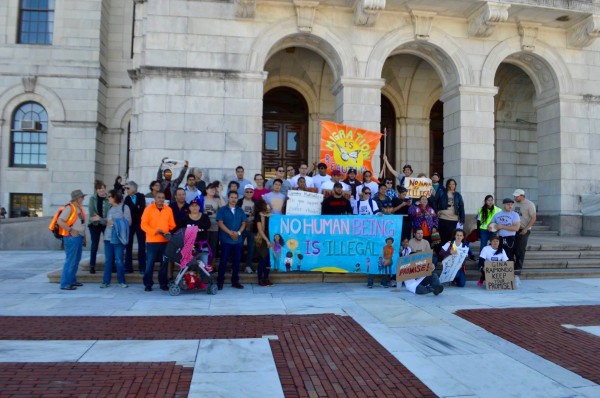










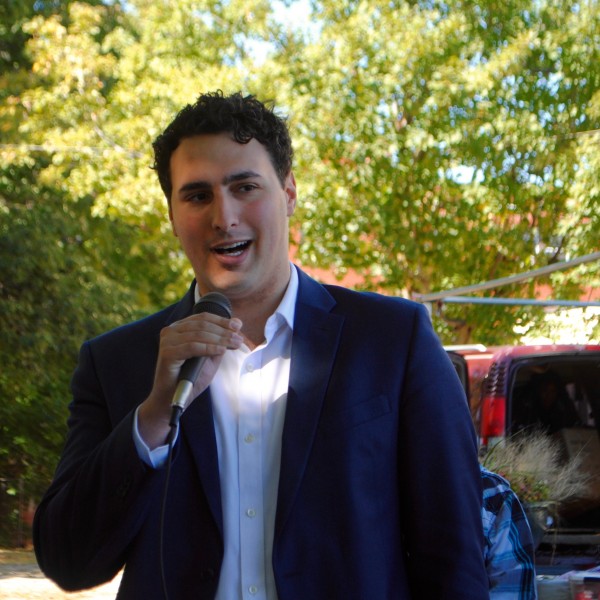
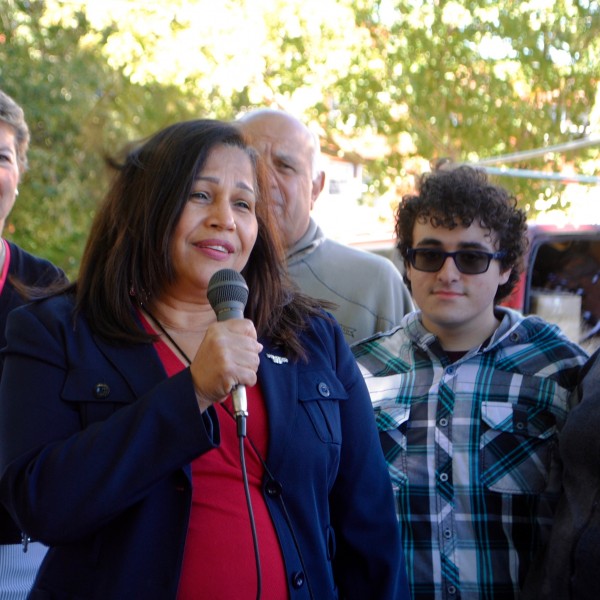

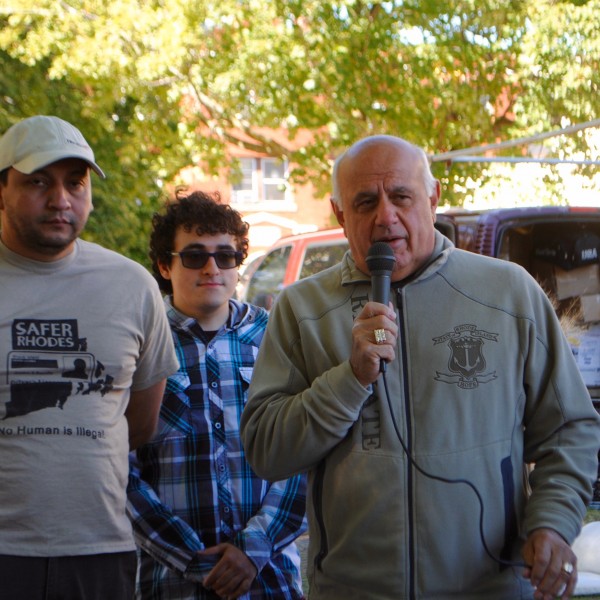



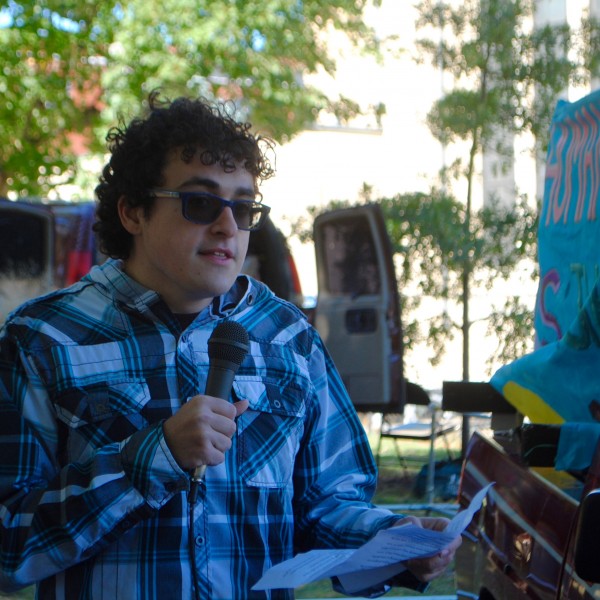
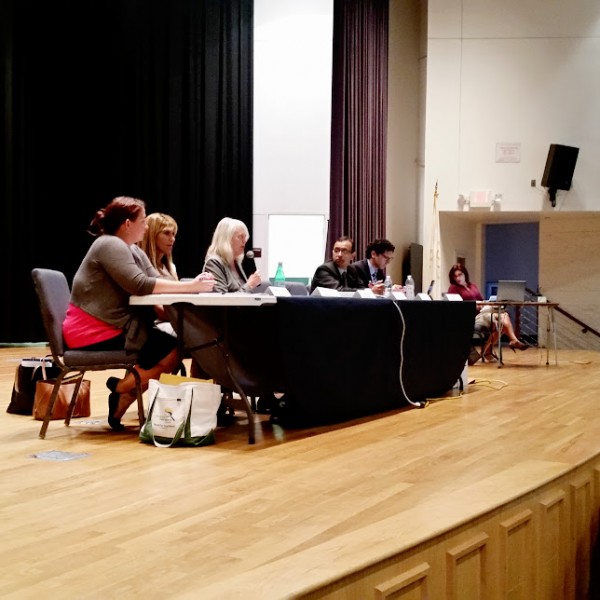 The Energy Facilities Siting Board (EFSB) public hearing in Warwick Wednesday evening, coming near the end of the process to decide the fate of Invenergy‘s proposed $700 million fracked gas and diesel oil burning power plant, was filled with almost philosophical reflection, with many speakers, who have sat through dozens of EFSB, town council, zoning and department meetings and honed their public speaking skills, commenting with a battle weary determination and steely resolve.
The Energy Facilities Siting Board (EFSB) public hearing in Warwick Wednesday evening, coming near the end of the process to decide the fate of Invenergy‘s proposed $700 million fracked gas and diesel oil burning power plant, was filled with almost philosophical reflection, with many speakers, who have sat through dozens of EFSB, town council, zoning and department meetings and honed their public speaking skills, commenting with a battle weary determination and steely resolve.
Perhaps no one summed up the emotional toll of the process better than Kerri Fagan, who reminded the board of the promises made regarding the fairness of the process by elected officials such as Governor Gina Raimondo and Senator Sheldon Whitehouse as well as by the board members themselves, then launched into a long list of irregularities and seeming violations of the process that tend to favor Invenergy and disfavor the towns people.
Six of the twelve advisory opinions, said Fagan, maintain that, “Invenergy did not provide enough information before the deadline for them to submit an appropriate advisory opinion.”
Fagan explained that the process allows for the RI Public Utilities Commission advisory opinion, “to be completed by a single person, [Herbert DeSimone Jr]” after one of the other members recused themselves because they “previously expressed support for the project.” The process of having one person make that decision was questioned, said Fagan, but was ruled appropriate by the single board member, DeSimone Jr.
“The process allows Invenergy representatives to falsely testify at open meetings,” said Fagan. “Did the process require them to acknowledge their misinformation? No. There are probably people who still believe they will receive great rate savings,” if the power plant is built. Fagan says the process also allowed Invenergy to falsely advertise meeting locations and times.
The process, said Fagan, requires that the Burrillville Town Council remain neutral throughout the process, yet Governor Raimondo and Senator Whitehouse can express their support for the project.
The process allows attorney Richard Sinapi to represent the Harrisville Water Board, but also lobby against Burrillville Representative Cale Keable‘s EFSB bill on behalf of labor unions, while also allowing his law firm to write a position opposing the Town of Burrillville’s Motion to Dismiss. “The question of conflict of interest was raised, but [Sinapi] continues to represent parties on both sides of this proposal.”
The process allows the Governor and labor unions to advocate for the process based on the jobs it will create, but the EFSB is not charged with creating jobs, but with determining energy needs and judging environmental impacts. “I don’t believe the EFSB has a responsibility to create jobs,” said Fagan,” and I don’t believe it is an appropriate outcome to consider in this setting. Yet the process has allowed this to be a major rallying cry for those that support the process.”
“It is very hard for the residents to respect the process,” said Fagan, “as it seems to be flawed in all areas. The EFSB board works for the Governor. The Governor supports the project. Companies such as Goldman Sachs and General Electric appear to be partners in both this proposed project as well as working with the Governor on statewide initiatives.
“Why has there not been a comprehensive environmental impact statement completed?”
“We can only hope that [the EFSB] will truly listen and read through why this is the wrong project and in the wrong location,” said Fagan, wrapping up, “We hope that you have the strength to fight the state wide politics and make a decision on the merits of the project and truly consider the negative, long lasting detrimental impacts that this project will bring to the Town of Burrillville.”
Other speakers that leaped out at me include Paul Roselli of the Burrillville Land Trust, who praised the RI Department of Enviornmental Management‘s advisory opinion.
Cranston native Rhoda Northup said that this was “not just a Burrillville issue, but a statewide issue. It’s also a Connecticut and Massachusetts issue. “Do we go thirsty and the power plant gets the water?” asked Northup.
Suzanne Dumas
Sally Mendzela spoke about the reality of climate change, and how plants like the one proposed by Invenergy will doom our planet.
Lynn Clark
Mary Gauvin
Smart energy conservation could easily absorb the 10,000 megawatts going offline, the power plant is not needed said Vito Buonomano.
Lisa Petrie explained her concerns as a mother, and explained why she chose to be arrested outside Governor Raimondo’s office.
Donna Woods told the EFSB members, “You do know better” than to approve this plant.
Denise Potvin
This public comment meeting was scheduled for after the last of a dozen advisory opinions were filed with the EFSB. Many who spoke at the hearing pointed out that at least six of the advisory opinions are incomplete, because Invenergy could not supply required information.
The testimony and hearing was also colored by the fact that the Burrillville Town Council will be voting tonight on whether or not to oppose the power plant in a meeting at the Burrillville High School Thursday night, and will be voting on whether to approve or reject a proposed tax treaty between the town and Invenergy on Monday evening. The groups in opposition to the power plant from Burrillville do not want the town council to approve the tax treaty, which may characterized as selling the town for a measly $92 million.
There will be one more public comment meeting, originally to be held on October 3 but not postponed, date to be determined due to Invenergy’s request for a thirty day extension as they work to secure a water source for their plant. In the meantime, the EFSB board will hold a meeting to decide on two motions to dismiss Invenergy’s application, one from the Town of Burrillville and the other from the Conservation Law Foundation (CLF) based on Invenergy’s incomplete application and failure to provide adequate or timely information when requested.
Here is the video of all the speakers:
Richard Dionne said that Invenergy should be required to submit all requested information.
Doug Geblinske of TEC-RI spoke in favor of the power plant.
Eugenia Marks, noted environmentalist former head of the RI Audubon Society, spoke against the plant.
David Brunetti questioned Invenergy’s “cicular logic” in determining that Burrillville was the location for this plant.
Kathryn Scaramella questioned the “small but meaningful savings” ratepayers will receive if the plant is built. She pointed out that the extension Invenergy requested was a violation of terms EFSB Chair Meg Curran set out in May, when she said “all deadlines are set in law.”
Mary Jane Bailey said the location chosen for the power plant was rejected when the Ocean State Power Plant was built in the 1980’s. “If it wasn’t right in the ’80s it’s not right now,” said Bailey.
Ben Weilerstein, of the Toxic Action Center said that the same kind of action taking place in Burrillville is what helped defeat the pipeline project in Massachusetts.
Meg Kerr, senior policy director for the RI Audubon Society spoke against the plant.
John McMullen, business agent for the Plumbers and Pipefitters union spoke in favor of the plant, saying there was a need for the energy and the jobs. He said that RI Building Trades supported Deepwater Wind and that a life of temporary jobs allowed him to raise his daughters and send them to college.
Irene Watson noted that her community’s public speaking skills have improved because of the countless meetings they’ve been to.
Kenneth Putnam Jr spoke from the heart. He’s 76 and 1 day old.
Betty Mancucci
John Anthony Scott
Jeremy Bailey
Roy Coloumbe said he represents two dozen iron workers from Burrillville who support the project.
Attorney Greg Mancini is Richard Sinapi’s law partner and represents the RI Building Trades.
“The power plant will be around 30-40 years from now, says Stephanie Sloman. “”I’ll be dead, you’ll be dead,” she told the EFSB members, “75 percent of the people here will be dead. I’m not trying to be funny.” It’s about the future.
Sloman gave each member of the EFSB this picture, to remind them of the species they will either help to save or destroy, depending on how they decide on the power plant.

Cynthia Crook-Pick compared the power plant to 38 Studios, both are being pushed forward with inadequate information.
Karen Palmer
Jason Olkowski
]]>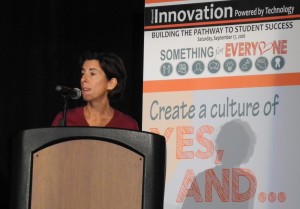
Hundreds of educators, school administrators, and students came together at the RI Convention Center today for the fifth annual “Innovation Powered by Technology” conference, sponsored by the RI Dept. of Education. Across dozens of small discussions, panels, and demos, participants from all across the state had the chance to share best practices, learn about innovations, and build community. A detailed program is available and the day’s events were captured in a rich Twitter stream.
Two of the highlights were back-to-back talks just after lunch, featuring Gov. Gina Raimondo on her perspective on technology in the state’s education system, and a high-energy presentation on personalized learning by Rhode Island’s chief innovation officer, Richard Culatta.
Gov. Raimondo began by expressing thanks for Rhode Island’s cadre of outstanding educators, “People like yourselves who are always willing to learn more, do more, be on the cutting edge for our kids. And technology is core to that. Technology gives us a direct connection to how our students think, act, work, and communicate. The smarter we can be about technology, the better we’ll be able to teach and deliver education.”
She acknowledged the challenges that our education system faces. “The thing that most keeps me up at night,” Raimondo said, “is making sure that every Rhode Islander has the skills and education they need in order to get a good job in this economy. This economy is, in many ways, scary. It has more risk than it ever had, it’s more dynamic than its ever been, and requires a higher degree of skill and education than ever in order to be successful. 70-plus percent of all good jobs in Rhode Island require some degree past high school, but only about 40 percent of Rhode Islanders have that. So every child that’s in our K-12 system right now, it’s on us to make sure that they get the skills that they need in order to be successful.”
“That is the thing that I think will turn Rhode Island’s economy around,” Raimondo continued. “Businesses are going to want to be here if we have a skilled talent base.”
The Governor talked about some of the successes of the past two years.
“We are rolling out the CS4RI program. People are raising their hands, schools, teachers, principals, students, at a faster rate than we expected, we’re ahead of all of our goals. And I’m proud that Microsoft chose Rhode Island — we’re the only state where they’re doing a statewide rollout.”
“We also have rolled out the Advanced Coursework Network and PrepareRI to make sure that every high school student in a public school can take college-level courses for college credit for free. In some ways, this isn’t a new program, but instead of $200 a class, it’s free. That’s what it’s all about: taking away what might seem like a small barrier and having a massive impact. if you can get a semester of college under your belt for free in high school, that can change your life.”
“We’re working as hard as we can to get P*Tech off the ground, thank you to Westerly and Rogers, and we’re talking about it with Woonsocket High School and PCTA. I was down in Westerly two weeks ago, and it is so exciting talking to these young people. I said, ‘Why did you sign up for P*Tech?’ and they all had an answer. I was so impressed. Ninth graders telling me, ‘Because I think it will give me an opportunity.’ They know all about it, and they were psyched to be in the program.”
A reporter from RI Future had the chance to follow up with Raimondo to ask just how significant these kinds of expanding digital efforts are in attracting companies like PayPal to the state.
“Very important,” Raimondo said. “The primary reason to do it is because these kids deserve a chance to be successful, and a good education is what is necessary. But it’s very important. I have many conversations with companies looking at coming to Rhode Island, and they ask me, ‘What are you doing, Governor, to make sure that ten or 15 years from now, we have a skilled pipeline of people that have computer skills?’ They don’t want to just know about RIC, CCRI, URI, and today’s graduates, they want to know, if we come to Rhode Island, if we are going to be there for twenty years, are you building a pipeline.”
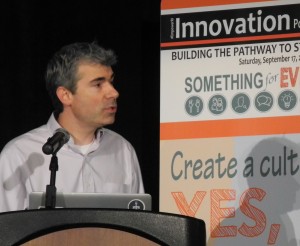
Richard Culatta was hired in the new role of Chief Innovation Officer in January, after working in the US Department of Education office of Educational Technology, and he has clearly hit the ground running on the issue of personalized learning, which he discussed in a rapid-fire talk.
“Nobody says we shouldn’t adapt learning to the students,” said Culatta. “But the challenge is, how do we do that? What tools are necessary? What do we need?”
“As a teacher, I knew I was teaching to the middle and that the schedule was trumping my kids. Imagine for a second, if we said every student in our system, every student in Rhode Island, will have 100% mastery; what will be flexible is the time and the approach used to get there.”
“Do you need technology to personalize learning? No. Unless you want to do it at scale.”
“If you have a classroom with 3 or 4 or 5 students, well, at that point, you can do a heck of a lot of personalizing, tailor very much to their needs without any technology. But when you have a high school with 5 classes a day with 30 kids in each of the classes, the ability to tailor the learning would just be crushing. Imagine having 50 IEPs that you’re planning every day.”
“How can we get that granular level of tailoring for each student and not have it be too burdensome? What that looks like, we have to figure out. I don’t care if we’re delivering instruction on technology or not, that’s a separate conversation, but we need to figure out some tools that can help teachers manage personalized learning so that we can do this at scale.”
Culatta closed with a provocative thought about a new “digital divide” not about access, but about the difference between using digital tools in passive versus active modes.
“What I’d like us to all be thinking about is a new digital divide: a digital use divide. How can we be using technology not to digitize traditional practices, not to have a digital version of what used to be on the chalkboard. How do we use technology to engage and empower and connect, and allow our students to be designers and builders, and allow them to work on what they want, when they want — that’s relevant, and aligned to quality standards that are common and accepted across the board.”
“A rigorous curriculum that is still tailored to individual needs and not be soul-crushing for teachers to have to come up with 75 individual lesson plans every day. That’s what we’re trying to do. That’s pretty audacious. But I think Rhode Island is the place that can pull it off faster and better than anybody else, and if we do, it will transform not just Rhode Island, but the world.”
]]>